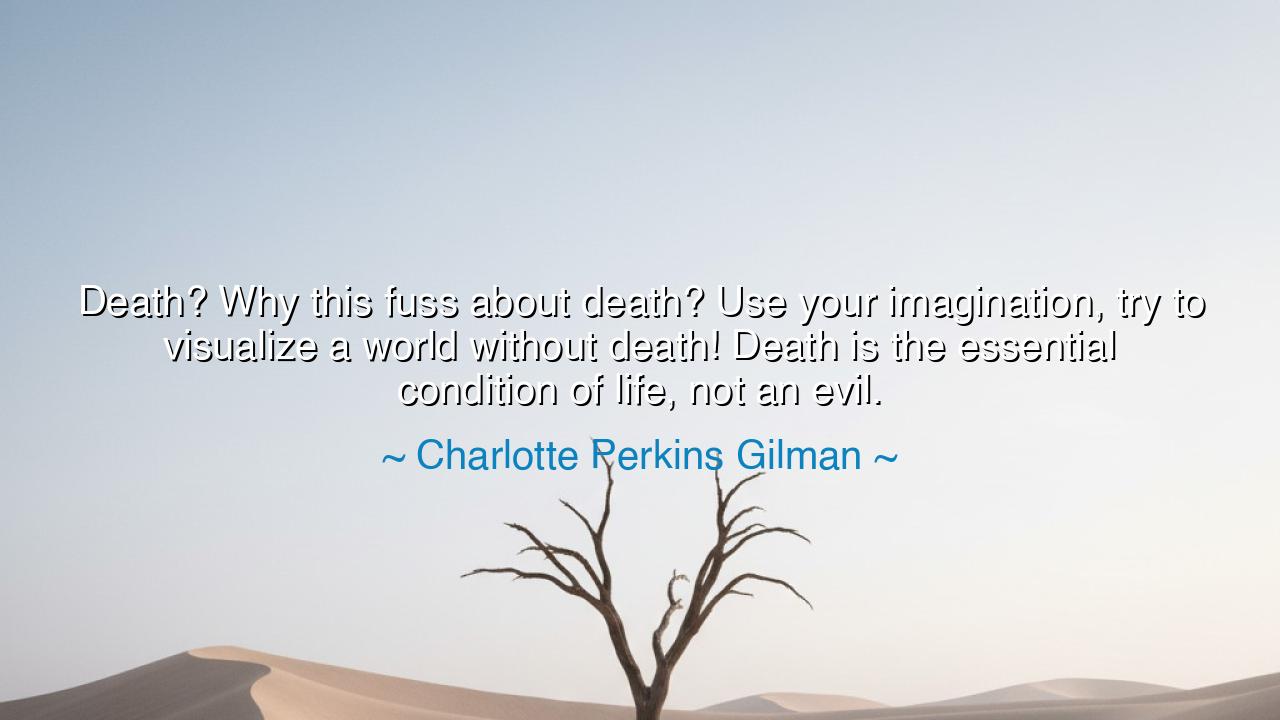
Death? Why this fuss about death? Use your imagination, try to
Death? Why this fuss about death? Use your imagination, try to visualize a world without death! Death is the essential condition of life, not an evil.






"Death? Why this fuss about death? Use your imagination, try to visualize a world without death! Death is the essential condition of life, not an evil." These words from Charlotte Perkins Gilman strike at the very heart of one of humanity's deepest fears—death. She challenges us to reconsider our perspective, to shift our view of death from something feared and reviled to something that is, in fact, an essential part of life. Gilman urges us to use our imagination to visualize a world where death does not exist, and in doing so, she compels us to confront the paradox: without death, life would lose its meaning, its urgency, its value. The transience of life is what makes it precious. Death, she asserts, is not an evil to be mourned endlessly, but a natural condition that gives life its form and structure.
In the ancient world, the Greeks grappled deeply with the concept of death, recognizing it as both inevitable and essential. The Stoics, for example, viewed death not as a calamity but as an event to be accepted with dignity and equanimity. Epictetus famously said, "Death is not an evil, but the refusal to accept death is." The Stoics understood that death is a part of life, a natural process that should neither be feared nor avoided. Instead, they believed that wisdom came from embracing death, from understanding its role in the greater scheme of things. Gilman, much like the Stoics, points to the fact that death, as much as it may cause suffering, is a force that shapes our lives, motivating us to act, to create, and to cherish the time we have.
Consider the ancient philosopher Socrates, who, facing his own death sentence, did not retreat in fear but used the occasion to speak about the immortality of the soul. In Plato's Apology, Socrates expresses the belief that death is either a peaceful rest or a transition to another form of existence. He is not afraid of death because he understands it as a natural part of the journey, something to be met with calm acceptance. Socrates did not fear death—he welcomed it as the final passage, trusting that it was neither an evil nor a curse, but an inevitable transition. In this way, Socrates embodied the wisdom of the ancients: death is not to be avoided or dreaded but acknowledged as a profound part of the cycle of existence.
In modern times, death remains a subject often shrouded in fear and avoidance. The Victorians with their elaborate mourning rituals, the Romantic poets with their fascination with death as a dark mystery, and even our contemporary society—fascinated with youth, immortality, and the search for eternal life—all reveal the human tendency to view death as a tragedy to be feared, hidden, and fought against. Yet, Gilman calls us to embrace a more balanced view of death. She invites us to imagine a world where death does not exist. What would life look like if we lived forever, unchanging? Would we still have the drive, the passion, the urgency to create, to love, to live fully? The answer, perhaps, is that without death, life would lose its most precious quality—its impermanence.
Take the example of the tulip, a flower that blooms for only a short period of time each year. Its beauty is in its transience—the knowledge that it will soon fade makes it all the more precious. If the tulip were to bloom forever, would it hold the same allure? Similarly, it is the knowledge of our own impermanence that drives us to seek meaning, to create, and to form deep connections with others. Gilman suggests that death is what gives our lives shape and purpose. Without it, we might drift aimlessly, forever stuck in the unchanging flow of eternity, never feeling the urgency to live fully.
The lesson, then, is one of acceptance and perspective. Death is not to be feared or shunned, but to be seen for what it truly is—a natural part of the cycle of life. To live fully, we must embrace death as a motivator, a force that compels us to act, to live meaningfully, and to cherish the time we have. By recognizing death as a companion on our journey, we can learn to live with greater purpose and gratitude. Just as Socrates faced death with wisdom and calm, we too can choose to accept it, knowing that it is not the end of life, but an essential part of the whole.
In practical terms, Gilman’s message encourages us to focus on what truly matters in our lives—our relationships, our passions, and the legacy we leave behind. Instead of spending our time running from death, we can live in such a way that we are not bound by the fear of its arrival but motivated by its certainty to live lives of meaning. Let us take time to appreciate the fleeting beauty of life, to savor the moments we have, and to find peace in the knowledge that death is not an enemy to be defeated, but a companion to be understood and embraced. For it is in accepting the reality of death that we may truly come to live.






AAdministratorAdministrator
Welcome, honored guests. Please leave a comment, we will respond soon